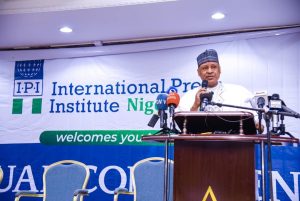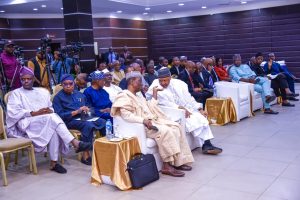
The Minister of Information and National Orientation, Mohammed Idris, has reaffirmed that despite occasional challenges, the press remains largely free in Nigeria, especially under President Tinubu, a staunch advocate for press freedom and the protection of Nigeria’s civic space.
Rabiu Ibrahim, the Special Assistant on Media to the Minister, said in a press release that the minister stated this in Abuja on Wednesday at the 2024 Annual Conference of the International Press Institute with the theme, “Democracy, Media Freedom and the Imperative of Protecting the Nigerian Civic Space”.
Idris said: “Now I am not saying that there have not been challenges and threats here and there, but on the whole, Nigeria has enjoyed an openness and freedom that has seen the welcome proliferation of press organizations across print, broadcast, and digital media.
“Since President Bola Ahmed Tinubu assumed office in May of 2023, and since I assumed office as Minister of Information and National Orientation in August of that year, we have asserted and reiterated our commitment to ensuring and expanding the freedom of the Nigerian press.

“Every time there has appeared to be a threat to this freedom, I have personally taken it upon myself to ensure that due process prevails and that the fundamental rights of the press are respected.
“The President is a firm believer in media freedom and the protection of Nigeria’s civic space. Not only has he been a media entrepreneur himself, but he has also earned himself a place in history as one of the champions of the pro-democracy movement that saw the permanent end to military rule in Nigeria.”
The minister said President Tinubu places a high premium on reforming and strengthening the judiciary in order to guarantee the existence and protection of fundamental rights that define the proper functioning of Nigeria’s civic space, including freedom of speech, freedom of association, and other constitutionally enshrined liberties.
Idris, however, emphasised that the civic space is not solely about freedoms but also about responsibilities, including showing respect and accommodation to all stakeholders.
“It is about understanding that for every right there is a corresponding responsibility, and that freedom does not come unbridled.
“It is knowing that media freedom involves knowing and acknowledging the immense power that the press wields, as shapers and molders of public opinion and the permanent public record, and not abusing this power.”

The minister stressed that the media should create room for healthy debate and not to demonize those with contrary opinions or views.
He said: “At the same time, there is ample room for holding institutions to account, whether public or private. And yes, those elected and appointed to public office must always understand that they keep these offices in trust for the people, and owe it to these owners to be accountable at all times.
“These truths can and must all coexist, if we want to forge a stronger democracy, as the foundation for the strong and prosperous Nigeria of our dreams.”
While speaking on the economy, the Minister said Nigeria is on the verge of fundamental economic reform, anchored on the Renewed Hope Agenda – a deliberate and comprehensive recalibration of a long-neglected system geared towards economic diversification, human capital development, infrastructure, innovation, competitiveness, and inclusive growth.
He said the proposed tax reform initiative of the President is envisioned to simplify Nigeria’s existing tax regimes and make compliance easier, while also reducing the tax burden on the most vulnerable Nigerians.
“A recurring highlight of the reform is the introduction of several new tax exemptions, that will benefit various categories of individuals and businesses,” he said.
Idris, who said that the ongoing tax reforms, would complement broader macroeconomic reforms aimed at driving Nigeria’s economic transformation, noted that trillions of Naira previously lost to wasteful and abused subsidy programmes are now being redirected into substantial savings, enabling the government to invest in critical sectors of the economy.
According to the minister, these funds are now financing high-impact initiatives such as physical and digital infrastructure, student loans and stipends, low-cost consumer credit, agricultural production, and targeted social investment programmes.
These measures, he said, are foundational elements for building a prosperous and globally competitive Nigeria.
